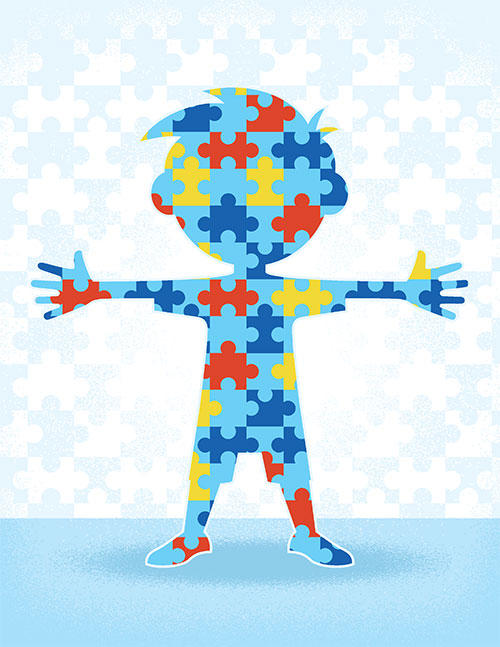Researchers at the Biozentrum, University of Basel, have demonstrated how mutations in a specific gene are linked with the social difficulties that can be associated with autism spectrum disorder (ASD). Their studies in mice showed that lack of functional neuroligin-3 gene reduces the effect of oxytocin, a neuropeptide hormone that is involved in regulating social behaviour in mammals. Describing the findings in Nature, the researchers also tested a treatment approach that they suggest could normalize social behavior in autism, and which generated positive initial results in animal models.
There has already been speculation that signals mediated by oxytocin could possibly play a role in autism. However, as research lead Peter Scheiffele, PhD, pointed out, “… we were very surprised to discover that mutations in neuroligin-3 impair oxytocin signaling pathways. We have succeeded in putting together two puzzle pieces of the mechanisms underlying autism.” The team reports on its research in a paper titled, “Rescue of oxytocin response and social behaviour in a mouse model of autism.”
Autism spectrum disorder affects about 1% of the population and is characterized by alterations in communication, repetitive behaviors, and social difficulties. There are numerous genetic factors involved in development of autism, but the mechanisms by which this variety of genetic alterations relates to symptoms are still largely unknown. This makes developing treatments particularly challenging, the authors wrote. As the authors pointed out, “… more than one hundred genetic mutations confer high risk for autism, with each individual mutation accounting for only a small fraction of cases.”
Recent therapeutic research has focused on the neuropeptides oxytocin and vasopressin, which regulate aspects of social behavior in mammals. “Oxytocin and vasopressin are two evolutionarily conserved neuropeptides with important functions in the control of social behaviors, in particular pair-bonding and social recognition,” the team continued. In humans, genetic variation in the oxytocin receptor (OXTR) gene is linked to individual differences in social behavior. And in mice, mutations in the genes encoding oxytocin or its receptor result in a loss of social recognition and social reward signaling. “Consequently, signaling modulators and biomarkers for the oxytocin or vasopressin system are being explored for conditions with altered social interactions such as autism spectrum disorders …” the team noted.
One of the genes associated with autism risk encodes the synaptic adhesion molecule neuroligin-3. “Nlgn3 encodes a synaptic adhesion molecule, and Nlgn3 mutant mice exhibit a range of behavioral alterations, including motor stereotypies, alterations in social novelty preference, social reward, and responses to social novelty tests,” Scheiffele and colleagues explained. They set about investigating oxytocin responses in mice without a functional Nlgn3 gene. Their results uncovered an unexpected link between the neuroligin-3 gene and the oxytocin signaling pathway. Their experiments demonstrated for the first time in mice that an autism-associated mutation in the neuroligin-3 gene disrupts the oxytocin signaling pathway in the neurons of the brain’s reward system and, as a consequence, reduces social interactions between animals. Unexpectedly, loss of neuroligin-3 was found to affect the balance of protein synthesis in these neurons, and so disrupted the neuronal responses to oxytocin. “ … we report that an autism-associated mutation in the synaptic adhesion molecule Nlgn3 results in impaired oxytocin signaling in dopaminergic neurons and in altered behavioral responses to social novelty tests in mice,” the investigators reported.
Their experiments also demonstrated that alterations in the oxytocin system in neuroligin-3-knockout mice can be restored by treatment using a pharmacological inhibitor of protein synthesis, which normalized the animals’ social behavior. The compound is one of a series of highly specific MAP kinase-interacting kinase (MNK) inhibitors originally designed for oncology applications, the team explained. “Treatment of Nlgn3-knockout mice with a new, highly specific, brain-penetrant inhibitor of MAP kinase-interacting kinases [MNKs] resets the translation of mRNA and restores oxytocin signaling and social novelty responses,” the scientists wrote. “This pharmacologically recovered social recognition behavior was dependent on oxytocin receptor function.”
Importantly, the same inhibitor also improved behavioral symptoms in a second rodent model of autism, indicating that it could be more widely applied in the treatment of autism spectrum disorder. “The common disruption in translational machinery and phenotypic rescue in two very different genetic models indicate that genetic heterogeneity of ASD might be reduced to a smaller number of cellular core processes,” the scientists stated. “This raises the possibility that pharmacological interventions targeting such core processes may benefit broader subsets of patient populations.”
The newly discovered convergence between three important elements—a genetic factor, the changes in neuronal protein synthesis, and the regulation of social behavior by the oxytocin system—sheds some light onto how multiple factors implicated in autism may be connected. In addition, the findings may open new approaches for the treatment of certain aspects of social behavior in some cases of autism, where appropriate. “This work uncovers an unexpected convergence between the genetic autism risk factor Nlgn3, translational regulation, oxytocinergic signaling, and social novelty responses,” the team concluded. “We propose that pharmacological inhibition of MNKs may provide a new therapeutic strategy for neurodevelopmental conditions with altered translation homeostasis.”


